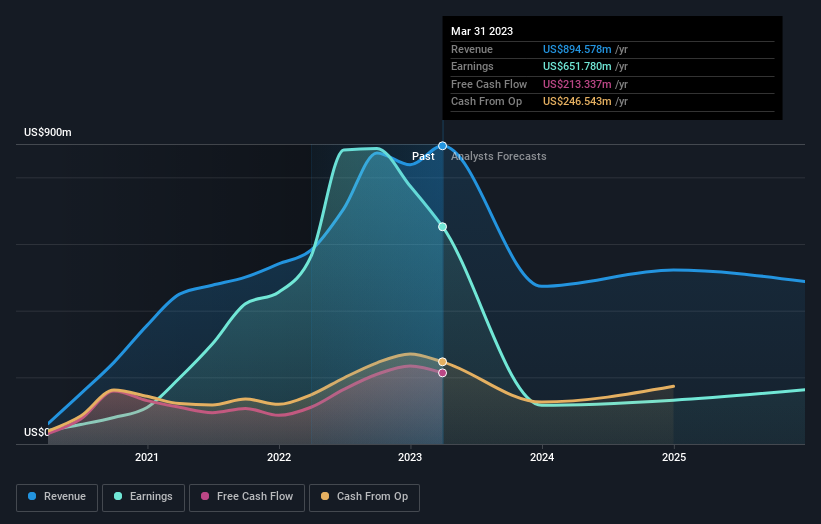With 67% ownership, Tricon Residential Inc. (TSE:TCN) boasts of strong institutional backing
Key Insights
Given the large stake in the stock by institutions, Tricon Residential's stock price might be vulnerable to their trading decisions
50% of the business is held by the top 22 shareholders
Ownership research along with analyst forecasts data help provide a good understanding of opportunities in a stock
If you want to know who really controls Tricon Residential Inc. (TSE:TCN), then you'll have to look at the makeup of its share registry. The group holding the most number of shares in the company, around 67% to be precise, is institutions. That is, the group stands to benefit the most if the stock rises (or lose the most if there is a downturn).
Because institutional owners have a huge pool of resources and liquidity, their investing decisions tend to carry a great deal of weight, especially with individual investors. Hence, having a considerable amount of institutional money invested in a company is often regarded as a desirable trait.
In the chart below, we zoom in on the different ownership groups of Tricon Residential.
Check out our latest analysis for Tricon Residential
What Does The Institutional Ownership Tell Us About Tricon Residential?
Many institutions measure their performance against an index that approximates the local market. So they usually pay more attention to companies that are included in major indices.
As you can see, institutional investors have a fair amount of stake in Tricon Residential. This implies the analysts working for those institutions have looked at the stock and they like it. But just like anyone else, they could be wrong. If multiple institutions change their view on a stock at the same time, you could see the share price drop fast. It's therefore worth looking at Tricon Residential's earnings history below. Of course, the future is what really matters.
Since institutional investors own more than half the issued stock, the board will likely have to pay attention to their preferences. Hedge funds don't have many shares in Tricon Residential. Our data shows that T. Rowe Price Group, Inc. is the largest shareholder with 6.7% of shares outstanding. For context, the second largest shareholder holds about 4.9% of the shares outstanding, followed by an ownership of 4.3% by the third-largest shareholder. Additionally, the company's CEO Gary Berman directly holds 0.6% of the total shares outstanding.
After doing some more digging, we found that the top 22 have the combined ownership of 50% in the company, suggesting that no single shareholder has significant control over the company.
While it makes sense to study institutional ownership data for a company, it also makes sense to study analyst sentiments to know which way the wind is blowing. There are plenty of analysts covering the stock, so it might be worth seeing what they are forecasting, too.
Insider Ownership Of Tricon Residential
While the precise definition of an insider can be subjective, almost everyone considers board members to be insiders. Company management run the business, but the CEO will answer to the board, even if he or she is a member of it.
Most consider insider ownership a positive because it can indicate the board is well aligned with other shareholders. However, on some occasions too much power is concentrated within this group.
We can see that insiders own shares in Tricon Residential Inc.. It is a pretty big company, so it is generally a positive to see some potentially meaningful alignment. In this case, they own around CA$94m worth of shares (at current prices). It is good to see this level of investment by insiders. You can check here to see if those insiders have been buying recently.
General Public Ownership
With a 30% ownership, the general public, mostly comprising of individual investors, have some degree of sway over Tricon Residential. This size of ownership, while considerable, may not be enough to change company policy if the decision is not in sync with other large shareholders.
Next Steps:
I find it very interesting to look at who exactly owns a company. But to truly gain insight, we need to consider other information, too. To that end, you should learn about the 4 warning signs we've spotted with Tricon Residential (including 2 which can't be ignored) .
Ultimately the future is most important. You can access this free report on analyst forecasts for the company.
NB: Figures in this article are calculated using data from the last twelve months, which refer to the 12-month period ending on the last date of the month the financial statement is dated. This may not be consistent with full year annual report figures.
Have feedback on this article? Concerned about the content? Get in touch with us directly. Alternatively, email editorial-team (at) simplywallst.com.
This article by Simply Wall St is general in nature. We provide commentary based on historical data and analyst forecasts only using an unbiased methodology and our articles are not intended to be financial advice. It does not constitute a recommendation to buy or sell any stock, and does not take account of your objectives, or your financial situation. We aim to bring you long-term focused analysis driven by fundamental data. Note that our analysis may not factor in the latest price-sensitive company announcements or qualitative material. Simply Wall St has no position in any stocks mentioned.
Join A Paid User Research Session
You’ll receive a US$30 Amazon Gift card for 1 hour of your time while helping us build better investing tools for the individual investors like yourself. Sign up here


